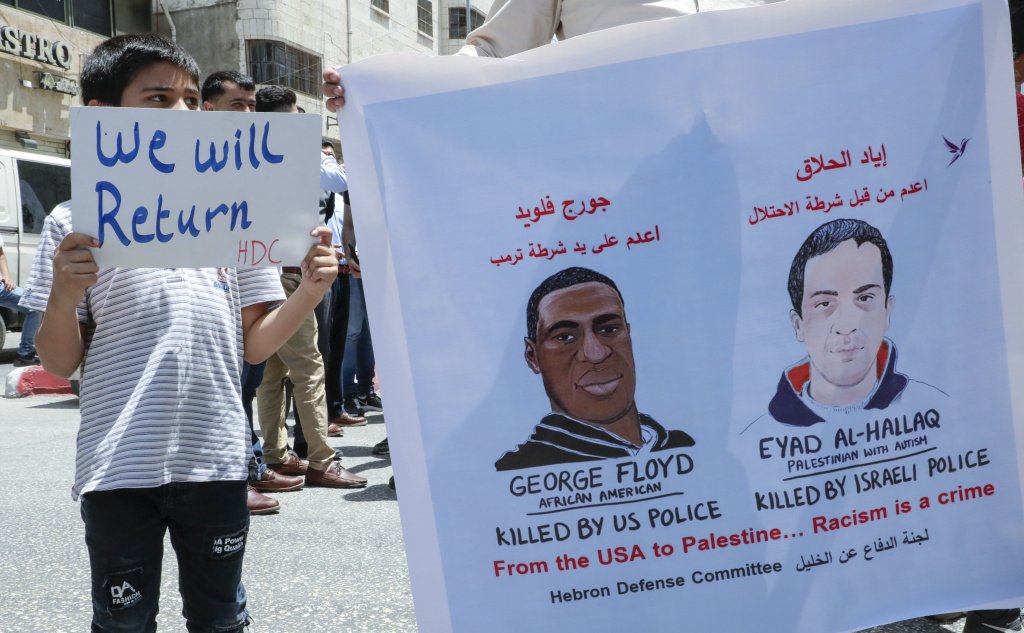
- ARAB NEWS
- 14 Jul 2025

A 32-year-old man with the mental age of an eight-year-old child was executed by Israeli soldiers on May 30, shot multiple times while cowering behind his caregiver near his special needs school in the Old City of Jerusalem. The coldblooded murder of Eyad Hallaq might not have received much attention if it were not for the fact it took place five days after the similarly heartbreaking murder of 46-year-old black man George Floyd at the hands of police in the US.
The two crimes converge, not only in their repugnant nature and the moral decadence of their perpetrators, but also because countless American police officers have been trained in Israel, by the very security forces that killed Hallaq. The practice of killing civilians with efficiency and callousness is now a burgeoning market.
When thousands of people rushed to the streets in Palestine, including hundreds of Israeli Jewish activists in Jerusalem, chanting, “Justice for Eyad, justice for George,” their cries were a spontaneous and heartfelt reaction to an injustice that was so great, and so blatant.
Hallaq’s story might appear to be unique, as the “suspected terrorist” was killed while walking on King Faisal Street in Jerusalem, on his way to take out the trash. He was afraid of soldiers and terrified of blood. “He was also afraid of the armed police officers who stood along the route to the special needs center he went to, where he participated in a vocational training program,” Haaretz reported. Hallaq’s many fears were ultimately realized. Even an autistic person in Palestine is not safe from Israeli soldiers.
“He was our mother’s love, her entire life,” Hallaq’s sister Diana said in an interview with +972 Magazine. “She would hold his hand like he was a baby, and he would walk with her to the market or the mosque or the clothing store. He was like her shadow. She worried about him and whether other kids would bother or hurt him.”
Caught off-guard by the grisly nature of the murder and the mental state of the victim, Israel’s spin doctors moved quickly to contain the damage, initially spreading the lie that Hallaq was carrying a toy gun at the time of the shooting, before backing off and promising an investigation. But what is there to investigate?
In recent years, the Israeli army has changed its code of conduct, adopting a shoot-to-kill policy with regard to any Palestinian they suspect of attempting to harm Israeli occupation soldiers, even when the alleged attacker is no longer posing a threat. In the case of the Gaza Strip, where protesters are separated from Israeli snipers by barbed wire and nearly a mile of empty space, the Israeli military issued orders in June last year to shoot and kill “key instigators” of mass protests even while “at rest.” Hundreds of people have been killed in this way during Gaza’s Great March of Return protests, and the “key instigators” have included medics, journalists and children.
Indeed, the killing of Palestinian civilians is a regular occurrence. It is the devastating routine Palestinians have been forced to live with for many years, and for which Israel has never been held accountable.
Only one day before Hallaq was murdered, Fadi Samara Qaad, 37, was killed by Israeli occupation soldiers while driving his car near the Palestinian village of Nabi Saleh, west of Ramallah. The Israeli military immediately claimed that Qaad “tried to ram his car into a group of soldiers” before they opened fire, killing him on the spot. This is the go-to Israeli military pretense offered when a Palestinian driver is shot and killed by its soldiers. Otherwise, the Palestinian victim, no matter whether they are a man, woman or child, is accused of carrying a “sharp object.”
Hallaq’s mental disability might have spared him, in the eyes of some, from being an archetypical “terrorist,” but the Israeli army still raided his house, looking for “evidence” that would implicate him and be useful in their sinister propaganda.
In the case of Qaad — a Palestinian worker on his way to join his wife in a nearby town to celebrate the Eid holiday — the Israeli army statement suffices, no questions asked. This is the same stifling logic that has prevailed in Palestine for so many years. Children are killed for throwing stones at men with guns who have invaded their homes and villages; pregnant women are gunned down at Israeli army checkpoints; and amputees in wheelchairs are shot dead by snipers while protesting and demanding their freedom.
Hallaq’s many fears were ultimately realized. Even an autistic person in Palestine is not safe from Israeli soldiers.
Ramzy Baroud
All of this is taking place amid the absence of any promising political progress. Even the protracted and ultimately useless “peace process” has been halted in favor of greater American backing of Israel and of the Tel Aviv government’s mad rush to expand illegal Jewish settlements. To secure his colonial accomplishments — i.e., land theft — Prime Minister Benjamin Netanyahu is preparing for the expansion of Israel’s borders through the annexation of yet more Palestinian land.
Inspired by the common struggle that ties them with their African-American brethren, Palestinians are now left only with their cries for justice: Palestinian Lives Matter. They continue to hope that, for once, the world may hear their screams, echo them, and perhaps do something.